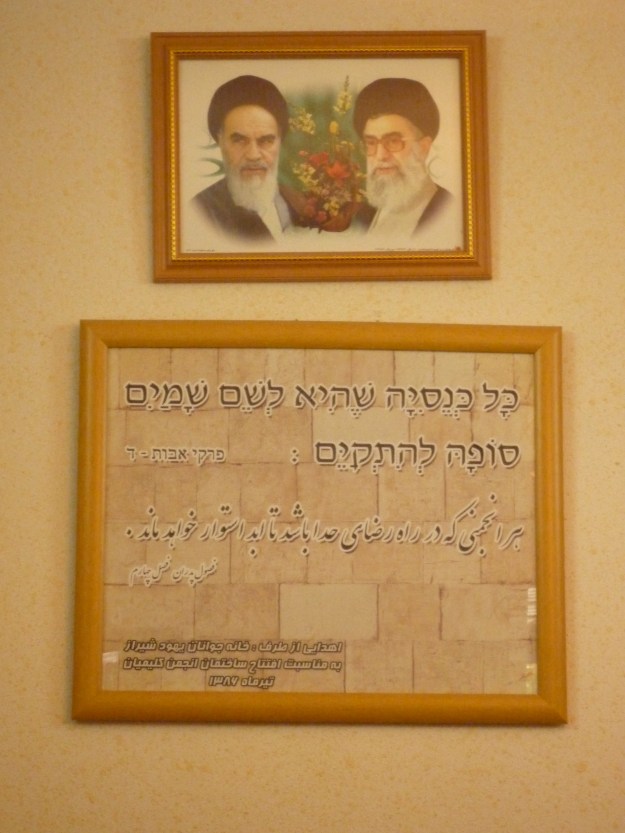
I was pleased to read two particularly intelligent Iran-related op-eds in the NY Times today: one by columnist Roger Cohen on the Iranian Jewish community and another by Iranian journalist Ali Reza Eshraghi on the importance of engaging diplomatically with Ahmadinejad.
From Cohen’s piece:
Perhaps I have a bias toward facts over words, but I say the reality of Iranian civility toward Jews tells us more about Iran — its sophistication and culture — than all the inflammatory rhetoric.
That may be because I’m a Jew and have seldom been treated with such consistent warmth as in Iran. Or perhaps I was impressed that the fury over Gaza, trumpeted on posters and Iranian TV, never spilled over into insults or violence toward Jews. Or perhaps it’s because I’m convinced the “Mad Mullah” caricature of Iran and likening of any compromise with it to Munich 1938 — a position popular in some American Jewish circles — is misleading and dangerous.
Cohen’s report is very much in line with my own experience. When I attended an interfaith delegation to Iran this past November, we spent considerable time with the Jewish community – and among the many surprising impressions we received was their obvious sense of comfort and safety living as Jews under an Islamic regime.
American Jews are invariably astounded when I tell them that I myself wore a kippah publicly throughout Iran without a moment’s nervousness. (Once we were approached and asked by an Iranian man if we were Jewish – he turned out to be a Jew himself and he promptly invited us to his shul for Shabbat). I’m not being facetious when I say that in retrospect, I realize I actually felt safer as a Jew walking the streets Tehran than I often do in Israel – the only place in the world, frankly, where Jewish lives are under constant threat.
I took the picture above, by the way, at the Jewish community center in Shiraz. Just another assumption-busting Jewish Iranian image: the obligatory Ayatollahs Khomeini and Khamanei hanging on the wall above a classic Jewish quote from Pirkei Avot in Hebrew and Farsi: “Every assembly that is for the sake of heaven will endure.”
(To those who live in the Chicagoland area: I’ll be speaking about my experiences in Iran tomorrow evening, Tuesday, February 24, 7:00 at the Chicago Chapter of the American Friends Service Committee
Actually, even the Jews that “fled” to Israel would prefer to go back to Iran:
http://www.jpost.com/servlet/Satellite?cid=1131043721479&pagename=JPost/JPArticle/ShowFull
“So 10 months ago gray-haired Ishak gave up on the Zionist dream and began to move his family and belongings back to Iran. He filled some of his numerous suitcases and trunks with the Persian carpets, silverware, and home decorations he came here with, and flew to Turkey with his two sons. There they sent their new Israeli passports by express mail back to his daughter in Israel. Then they took out their Islamic Republic of Iran passports and boarded a flight to Teheran. “
Brant,
You live in the midst of a vibrant Persian Jewish community. Do you not find it peculiar that your impression of their former home is so different from the opinion expressed by the vast majority of the community?
Lostandconfused,
I don’t know what Brant’s response will be, but I’ve been thinking a lot about this question.
On reflection, I don’t think that it’s peculiar. Rather, it speaks to the sorts of divisions that you might expect between an expatriated community and those who stayed behind.
Some of those divisions were probably there before the Iranian revolution: differences in social class and observance and national identification. Others are the sort of differences that would evolve over time, as each half of the community affirms to itself that it was right to either stay or go.
I don’t want to put words in your mouth, but I have heard others raise this question in order to suggest that the Iranian Jews who remain are essentially hostages, forced to say positive things in order to avoid punishment. But why would they be more fearful and secretive than the Soviet Jews who go the word out about their status to American visitors in the ’70s?
Maybe the Persian Jewish community here is like the German or French or Polish community who got out in time before the Holocaust. We’ll find out. But it strikes me that they might also be like a community of Tories in Canada 30 years after our own Revolution, driven out or fleeing in fear, their property expropriated, etc., and sure that this represents a truer version of life in the USA circa 1806 than the version a visitor to Boston or Philadelphia brings home.
Thanks for getting me thinking this morning!
lostand confused:
It’s important to bear in mind that the Jews who fled Iran after the revoltion did not emigrate as a result of religious persecution. The lion’s share of those who fled did so for political reasons – they were largely royalists who had supported the Shah’s rule; it was untenable of them to remain for obvious reasons.
I also think it’s a simplification to characterize the Jewish American Iranian community as uniform in its feelings about their former home. American Iranians still have important ties to their former home and these connections play out in many different ways. Like everything else, the reality is always much more complicated than we are led to believe.
Pingback: Iran’s Jews | RACBlog